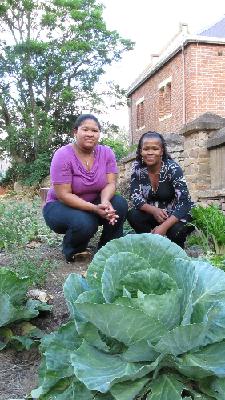
“They are our foot soldiers,” said Ndumiso Nongwe, Environmental Manager of Makana Municipality, referring to the 16 youth participants of last year’s Makana Youth Ward Waste Management Initiative. The youth, who are from seven of most intensely waste-prone wards in Grahamstown, were celebrated last Wednesday for their successful involvement in the programme. Along with learning principles of recycling and conservation, the youth developed critical organisational and diplomatic skills necessary to educate and promote change in their communities.
“We built experience and faced the problems in our areas. We went out into the public and interacted with people and were hands on with the whole thing. It was very exciting,” said Christeice Duiker, one of the local youths chosen for the programme. Although just a year ago Duiker was unemployed, her recent involvement in this project has given her the skills and confidence necessary to seek gainful employment. She now works in Adult Basic Education and Training (ABET) teaching communities how to save water, plant gardens and recycle.
Behind this environmentally and socially-centred initiative, lay the expertise of the Environmental Learning and Research Centre (ELRC) at Rhodes University working in partnership with Ndumiso Nongwe and Makana Municipality. The collaboration, focusing on developing youth citizenship, intended to creatively address the host of social and economic factors that contribute to the problem of waste in Grahamstown. Because poverty, unemployment and lack of education compound the issue, it was important to design an initiative that could speak to all these factors. Amongst the criteria for selecting the participants was evidence of previous voluntary work, an interest and involvement in environmental activities and being young and unemployed. It was also important that the youth be from wards recognised as ‘waste hot-spots’.
Prof Rob O’ Donoghue, of the ELRC recognised the significance of this partnership, “I think we have come a long way in fulfilling the dreams of Makana and Rhodes,” he said. Speaking about vision of the ELRC, O’Donoghue said, “We really intend this to be a place where people can begin to meet and learn together.”
Although the youth’s formal training has finished, the project will continue. Many are already doing waste-monitoring and education in their wards. They will remain passionate campaigners for the environment in their communities – some might even carry their activism into the workplace. Whatever the capacity, the initiative hopes it has sparked a desire for learning and education. For those like Duiker, this is just the beginning. She is glad to be applying her knowledge but hopes to soon extend her expertise by completing a Diploma in Environmental Affairs.
